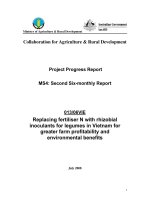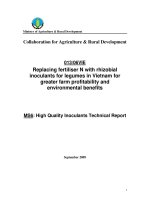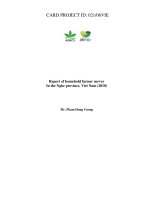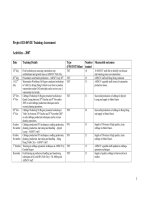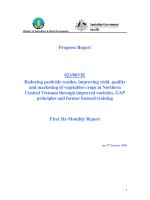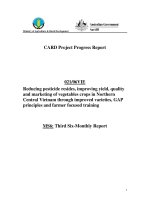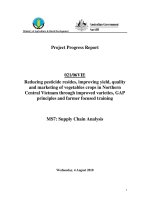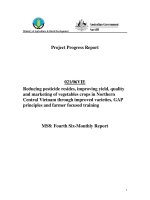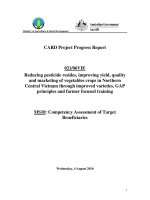Báo cáo khoa học nông nghiệp " Protecting productivity, incomes and trade through improved health surveillance of Vietnam’s plantations - MILESTONE 5 REPORT " pdf
Bạn đang xem bản rút gọn của tài liệu. Xem và tải ngay bản đầy đủ của tài liệu tại đây (901.61 KB, 37 trang )
Ministry of Agriculture & Rural Development
023/07VIE
Protecting productivity, incomes and trade through
improved health surveillance of Vietnam’s plantations
MILESTONE 5 REPORT
Date: 31 March 2009
Table of Contents
1. Institute Information ____________________________________________________ 3
2. Project Abstract________________________________________________________ 5
3. Executive Summary ____________________________________________________ 5
4. Introduction & Background ______________________________________________ 5
5. Progress to Date _______________________________________________________ 7
5.1 Implementation Highlights _____________________________________________ 7
5.2 Smallholder Benefits__________________________________________________ 9
5.3 Capacity Building ____________________________________________________ 9
5.4 Publicity ___________________________________________________________ 9
5.5 Project Management __________________________________________________ 9
6. Report on Cross-Cutting Issues ___________________________________________ 9
6.1 Environment ________________________________________________________ 9
6.2 Gender and Social Issues ______________________________________________ 9
7. Implementation & Sustainability Issues ____________________________________ 10
7.1 Issues and Constraints________________________________________________ 10
7.2 Options ___________________________________________________________ 10
7.3 Sustainability_______________________________________________________ 10
8. Next Critical Steps ____________________________________________________ 10
9. Conclusion __________________________________________________________ 10
10. Statuatory Declaration _______________________________________________ 10
11. Project Logframe_____________________________________________________13
12. Appendices _________________________________________________________19
2
Institute Information
Project Name
Protecting productivity, incomes and trade through improved health
surveillance of Vietnam’s plantations
Vietnamese Institution
Forest Protection Research Division, Forest Science Institute of
Vietnam
Vietnamese Project Team
Leader
Dr Pham Quang Thu
Australian Organisation
Department of Agriculture, Fisheries and Forestry, Office of the Chief
Plant Protection Officer
Australian Personnel
Dr Ian Naumann
Date commenced
March 2008
Completion date (original)
June 2010
Completion date (revised)
Feb 2010
Reporting period
12 months to March 2009
Contact Officer(s)
In Australia: Team Leader
Name:
Dr Ian Naumann
Telephone:
+61 2 6272 3442
Position:
Director SPS Capacity Building
Program
Fax:
+61 2 6272 5835
Organisation
Department of Agriculture,
Fisheries and Forestry
Office of the Chief Plant
Protection Officer
Email:
In Australia: Administrative contact
Name:
Ms Wendy Lee
Telephone:
+61 2 6272 3670
Position:
Program Coordinator SPS
Capacity Building Program
Fax:
+61 2 6272 5835
Organisation
Department of Agriculture,
Fisheries and Forestry
Office of the Chief Plant
Protection Officer
Email:
3
In Vietnam
Name:
Ass. Prof. Dr. Pham Quang Thu
Telephone:
84 4 836 2376
Position:
Head of Forest Protection Research
Division
Fax:
84 4 838 9722
Organisation
Forest Protection Research
Division, Forest Science Institute
of Vietnam (FSIV)
Email:
4
Project Abstract
Key achievements during the reporting period include:
• Organisation, coordination and delivery of Forest Health Surveillance and Diagnostics
Training Workshop in Brisbane, February 2009.
• Summary of responses to workshop evaluation questionnaires completed by workshop
delegates.
• Continued identification of pest and disease specimens from FSIV collection
• Procurement of equipment.
This project aims to establish a forest pest and disease database and reference collection, provide
training on pest surveillance and risk assessment, and establish a network of observation centres
supported by linkages with relevant national and regional organisations. The project outputs will
support forest pest detection and management, as well as provide the expertise and records to
underpin market access opportunities.
The rapid expansion of Vietnam’s forest coverage, provides opportunities for new international
export markets for timber products. However, it also represents new and increased risks from
forestry pests. Comprehensive surveillance and a database of pest and disease records are critical
to detecting incursions, managing outbreaks of pests and diseases, and producing pest lists.
Executive Summary
The project work has been undertaken by Primary Industries and Fisheries, Department of
Employment, Economic Development and Innovation (PIF DEEDI), formerly Queensland
Department of Primary Industries and Fisheries (QDPI&F). Progress during the past three months has
been largely in accordance with the project Logframe. Highlights include:
• Organisation, coordination and delivery of Forest Health Surveillance and Diagnostics
Training Workshop in Brisbane, February 2009.
• Summary of responses to workshop evaluation questionnaires completed by workshop
delegates.
• Continued identification of pest and disease specimens from FSIV collection.
• Procurement of equipment.
Key challenges during the next six months include organising and delivering the training workshop in
Vietnam to field staff involved in Forest Health Surveillance, and starting to prepare and collate
material and resources for preparation of the Vietnam Pest and Disease Field Guide and associated
reference material.
5
Introduction & Background
Project objectives and outputs expected are as follows:
Objective 1 To establish a forest pest and disease database and reference collection.
Output 1.1 Operational specimen-based forest pest and disease database.
Output 1.2 Identify key pests and diseases for each of the main plantation species grown in
Vietnam; reference material of these pests and diseases assembled.
Objective 2 To provide training on forest health surveillance, damage assessment, pest risk analysis,
collection, preservation, identification and curation and to increase awareness and understanding of
forest health surveillance among stakeholders.
Output 2.1 Surveillance training program for staff from regional research centres.
Output 2.2 Monitor awareness, knowledge, attitudes and practices of key stakeholder groups
towards forest health surveillance in Vietnam.
Output 2.3 Extension material produced detailing symptoms and management options for key
pests and diseases.
Objective 3 To establish and equip a pilot network of observation centres based on FSIV regional
centres supplemented by provincial Departments of Crop Protection.
Output 3.1 Network of suitably equipped surveillance centres established at 3 regional centres
throughout Vietnam.
Output 3.2 Ongoing Forest Health Surveillance and Static Trapping Programs initiated in
each regional centre.
Output 3.3 Forest Health Guide developed from existing data and data collected during
training.
Objective 4 To create linkages between Forestry, Agriculture and Quarantine agencies within
Vietnam and with regional and international organisations.
Output 4.1 Joint training in surveillance and diagnostics for FSIV and MARD.
Output 4.2 Information routinely exchanged between MARD and FSIV.
Objective 5 Manage and report on project.
The approach and methodology to achieve these objectives and outputs includes:
• Developing and deploying a Forest Health Surveillance database, incorporating existing
material from FSIV collections and incorporation of new FHS records.
• Accessing and identifying relevant material in existing insect collections in Vietnam.
• Providing practical training in forest health surveillance skills in Australia and Vietnam
supported by training materials.
• Preparing extension material and Forest Health Guide for FSIV staff and tree growers.
6
Progress to Date
1. Implementation Highlights
General
• The Forest Health Surveillance and Diagnostics Training Workshop was held in Brisbane
from 16-24 February 2009. The workshop was attended by eight delegates: four from the
Forest Science Institute of Vietnam (FSIV), Hanoi; three from FSIV regional centres and one
from Plant Protection Department, Ministry of Rural and Agriculture Development (MARD).
• Identification of specimens from FSIV collection is on-going.
Objective 1
Output 1.2 Identify key pests and diseases for each of the main plantation species grown in
Vietnam; reference material of these pests and diseases assembled.
• Identification of insect specimens brought from FSIV, Hanoi collection to PIF DEEDI,
Brisbane is on-going. The list of material identified to date is included (Appendix 1).
Objective 2
Output 2.1 Surveillance training program for staff from regional research centres.
• The Forest Health Surveillance and Diagnostics Training Workshop was held in Brisbane
from 16-24 February 2009. The workshop program is attached (Appendix 2). There were no
significant deviations to the program during the course of the workshop.
• The workshop was attended by the following delegates from Forest Science Institute of
Vietnam (FSIV) and Ministry of Agricultural Development (MARD):
Mr Le Van BINH (FSIV- Forest Plant Protection Research Division)
Mr Ngo Van CAM (FSIV- Tropical Forest Research Centre)
Mr Nguyen Manh HA (FSIV- Forest Plant Protection Research Division)
Ms Luu Thi Hong HANH (MARD- Plant Protection Department)
Mr Nguyen Tung LAM (FSIV- North Central Vietnam Forest Scientific and Production Centre)
Ms Nguyen Hoai THU (FSIV- Forest Plant Protection Research Division)
Mr Bui Quang TIEP (FSIV- North Eastern Vietnam Forest Scientific and Production Centre)
Mr Dao Ngoc QUANG (FSIV- Forest Plant Protection Research Division).
• Facilitators and presenters at the workshop included:
Dr Simon LAWSON (PIF DEEDI)
Dr Ross WYLIE (PIF DEEDI)
Dr Judy KING (PIF DEEDI)
Dr Manon GRIFFITHS (PIF DEEDI)
Dr Tim SMITH (PIF DEEDI)
Mr Geoff PEGG (PIF DEEDI)
Ms Janet McDONALD (PIF DEEDI)
Ms Rachel WAUGH (PIF DEEDI)
• Resource and training materials were prepared and presented to delegates during the course of
the workshop (Appendix 3). Much of this material will form the theoretical and resource basis
for the training workshops to be held in Vietnam during September/October 2009. These
training workshops will complement the Brisbane workshop, targeting regional field staff and
having a strong practical emphasis.
7
• Evaluation forms were given to delegates at commencement of the workshop and again at the
end. These involved a series of statements which delegates scored according to their level of
confidence in undertaking particular activities. Comparison can be made of the pre- and post-
workshop responses to assess the effectiveness of the workshop in addressing the different
aspects of training. During the post-workshop evaluation we also obtained feedback on the
organisation and running of the workshop to help in the development of similar training
workshops in the future. Evaluation forms and summarised responses are included (Appendix
4).
• At completion of the workshop each delegate was presented with a certificate of completion
(Appendix 5) and a CD containing copies of all presentations and materials handed out during
the course. A copy of this CD has been lodged at the FSIV library in Hanoi to be available to
any interested staff.
• An initial planning exercise for designing forest health surveys in each of the four regions
represented was carried out during the workshop. Target hosts and pests were broadly defined
for each of the regions, timing of surveys and survey methodologies to be used and how many
people in each region were to be on-trained to assist in carrying out surveys. A summary of
this session are provided in tabular format in Appendix 6.
Objective 3
Output 3.1 Network of suitably equipped surveillance centres established at three regional
centres throughout Vietnam.
• The three FSIV regional centres to be established and equipped as surveillance centres have
been identified as:
o Tropical Forest Research Centre, Chi Lang, Pleiku, Gia Lai.
o North Central Vietnam Forest Scientific and Production Centre, Dong Ha, Quang Tri.
o North Eastern Vietnam Forest Scientific and Production Centre, Ngoc Thanh, Vinh Phuc.
A delegate from each of these nominated centres was present at the workshop and will
provide a focal point for further training and surveillance work within the region. In addition
to the general field equipment and collecting and setting materials provided to each delegate
these regional representatives have also received:
o GPS unit.
o Maggy lamp for specimen sorting (delivered directly to Hanoi).
o Insect storage boxes (delivered directly to Hanoi).
o Intercept panel traps (delivered directly to Hanoi).
Output 3.2 Ongoing Forest Health Surveillance and Static trapping Programs initiated in each
regional centre.
• Staff from the three regional centres were trained in various aspects of Forest Health
Surveillance and Static Trapping Programs. They will on-train staff in their regions following
their return to Vietnam. All delegates were provided with training and reference material to
help with this including:
o Guidelines for surveillance for plant pests in Asia and the Pacific (Vietnamese
version, ACIAR/RIRDC 2005).
o Healthy hardwoods: a field guide to pests, diseases and nutritional disorders in
subtropical hardwoods (Carnegie, A., S Lawson, T Smith, G Pegg, C Stone and J
McDonald 2008).
o Pest and disease assessment in young eucalypt plantations: Field manual for using
the Crown Damage Index (Stone, C., M Matsuki and A Carnegie 2003).
o Manual of Diseases of Eucalypts in South-East Asia (Old, KM, MJ Wingfield and
ZQ Yuan 2003).
8
o Interactive key to insect orders (
o Handbook of Insect Collecting: Collection, Preparation, Preservation and Storage
(Smithers, CN 1982).
Objective 4
Output 4.1 Joint training in surveillance and diagnostics for FSIV and MARD.
• The training workshop included seven delegates from FSIV and one from MARD. The
workshop and training sessions in Vietnam in October 2009 will also include relevant
MARD staff whenever possible.
Objective 5 Manage and report on project.
Refer to the attached Progress Report Logframe for further details.
2. Smallholder Benefits
The stakeholder survey was developed with consideration for assessing the current knowledge and
future requirements of smallholders with respect to forestry pest and disease issues.
3. Capacity Building
The Forest Health Surveillance and Diagnostics Training Workshop held in Brisbane in February
2009 was a major capacity building component of the project.
4. Publicity
Contribution to CARD publications based on training in Australia is planned.
5. Project Management
Communication between project staff in Australia (Brisbane and Canberra) and Vietnam has been
very good. DAFF staff in Canberra provided invaluable logistic and administrative support in
preparation for the workshop, particularly in relation to the preparation of invitations, questionnaires,
and certificates. Workshop organisation was greatly assisted by numerous email exchanges between
organisers and delegates prior to the workshop. Since the workshop there have been a number of
requests from delegates for further information and advice on pests of forestry and other crops.
Report on Cross-Cutting Issues
1. Environment
There have been no major (negative) environmental issues associated with the Project to date.
2. Gender and Social Issues
There has been no opportunity to assess gender or social impacts in the project to date. Two of the
eight workshop delegates were women. To achieve this, the workshop organisers asked that one
delegate be reconsidered and the inclusion of a second female was successfully requested.
9
10
Implementation & Sustainability Issues
1. Issues and Constraints
Nothing to report.
2. Options
Nothing to report at this stage.
3. Sustainability
Nothing to report at this stage.
Next Critical Steps
Next critical steps in the project are:
• Continuing identification of material from the FSIV insect collection.
• Preparing and delivering the Forest Health Surveillance Training Workshop in Vietnam,
October 2009.
• Continued interaction with and mentoring of delegates from the Brisbane Workshop
Conclusion
At this early stage the project is progressing well overall, with most planned activities either complete
or well-advanced.
Statutory Declaration
The CARD contract is a lump sum outputs based contract. CARD does not require institutions to
submit receipts (although they need to be retained by institutions for accounting and taxation
purposes). CARD does need to be assured that the inputs detailed in the Contract Schedules have
been delivered. The statutory declaration below is to be used to provide this assurance.
STATUTORY DECLARATION
COLLABORATION FOR AGRICULTURE AND RURAL DEVELOPMENT PROGRAM
CARD Project Title: - Protecting productivity, incomes and trade through improved health surveillance of Vietnam’s
plantations.
CARD Project Number: - 023/07VIE
We the undersigned hereby declare that during the period 15/11/ 2008 to 30/03/2009 we have delivered the following
inputs to assist in implementation of the above project.
1: PERSONNEL INPUTS
Australian Personnel Provided
(Name)
Days in
Vietnam
Days in
Australia
Trips to
Vietnam
Simon Lawson 0 16 0
Manon Griffiths 0 9 0
Judy King 0 10 0
Ross Wylie 0 9 0
Janet McDonald 0 3 0
Geoff Pegg 0 7 0
Total 0 54 0
Vietnamese Personnel Provided
Days in
Vietnam
Phạm Quang Thu 11
Đào Ngọc Quang 13
Lê Văn Bình 7
Nguyễn Mạnh Hà 7
Nguyễn Hoài Thu 7
Ngô Văn Cầm 5
Bùi Quang Tiếp 5
Phạm Tiến Hùng 5
Total 60
2: EQUIPMENT AND OTHER SERVICES
Equipment & Other Services Description Budget Limit Actual costs
Training Manuals $ 6,000.00 $ 2,900.00
Workshop consumables (Vietnam and Australia) $ 1,500.00 $ 2,050.52
Workshop Participant costs (airfares and visas) $20,560.00 $21,072.63
Workshop Participant costs (accommodation and per diems) $14,000.00 $13,971.45
Reference materials (FSIV and Centres) $ 3,500.00 $ 570.81
ACTUAL TOTAL $45,560.00*
TOTAL SHOWN IN BUDGET $40,700.00 $40,565.41
*Note: In the contract document the total amount budgeted for the workshop is $40,700. However based on the
breakdown given the total workshop cost should be $45,560 as above. In order to remain within the total budget of
$40,700 but retain the maximum number of delegates for the workshop adjustments were made in the provision of
reference and training materials. In particular this involved:
• obtaining free copies of material (eg Guidelines for Surveillance for Plant Pests in Asia and the Pacific -
provided courtesy of DAFF; Healthy hardwoods: a field guide to pests, diseases and nutritional disorders in
subtropical hardwoods – provided courtesy of Subtropical Forest Health Alliance)
• sourcing material available free from electronic sources rather than purchasing resources
• use of PIF DEEDI staff to collate and compile this material, in particular Judy King, Manon Griffiths and
Jacinta Mills.
11
12
12
Project Progress Against Proposed Objectives, Outputs, Activities And Inputs
Project Title: Protecting productivity, incomes and trade through improved health surveillance of Vietnam’s plantations
Vietnamese Implementing Institution: Forest Protection Research Division, Forest Science Institute of Vietnam:
PROPOSAL
PROGRESS REPORT
Narrative Information Required Performance
Measures
Assumptions
Information Required
Objective 1
To establish a forest pest and disease
database and reference collection.
Database developed
and being used by
project participants;
voucher specimens
routinely added to
collection and
collection
maintained.
Training gives
participants confidence
to use and maintain
database and reference
collection.
Project objective still relevant.
No need to modify logframe.
Output 1.1
Operational specimen-based forest pest
and disease database.
Forest pest and
disease database
developed, tested and
being used
operationally by
FSIV participants.
Specimens can be
identified reliably.
Output still relevant and achievable.
Activity 1.1.1
Development of forest health database for
Vietnam: development and
planning/training workshop.
Database suitable for
forest health
surveillance data
developed.
Planning/training
meeting takes place.
Compatibility can be
achieved between forest
health surveillance
database and National
Phytosanitary Database.
Although it is not anticipated that the regional field staff will have a
role in database management, an introduction to and training in the
use of the forest health database was carried out during the 16-24
February 2009 workshop in Brisbane. The training specifically
focussed on the linkage between use of the field form and the
associated entry fields in the database, as well as demonstrating the
capability of the database to generate a variety of summary and
detailed reports, nationally and regionally
Activity 1.1.2
Collation, examination and validation of
existing forestry collections in Vietnam.
Existing collections
examined and
Existing collections are
sufficiently
Not addressed during current reporting period.
13
validated by PIF
DEEDI and other
international experts.
representative of pests
and diseases to provide
reasonable basis for
planning diagnostic
training.
Activity 1.1.3
On-going entry of records into forest
health database.
Additional
taxonomic, spatial
and temporal data
added to database.
Surveillance undertaken
by staff of regional
centres.
Not addressed during current reporting period
Output 1.2
Identify key pests and diseases for each of
the main plantation species grown in
Vietnam; reference material of these pests
and diseases assembled.
Target list of key
pests and diseases
developed for future
training workshops
and production of
extension material.
Reference collections
established.
Pest and diseases are
tractable for diagnostic
training given facilities
in Vietnam.
Output still relevant and achievable.
Activity 1.2.1
Identify key pests and diseases based on
narrative data from field staff data and
existing records.
List includes
organisms to account
for most known
damage and
outbreaks.
Narrative data from
field staff can be
collated.
Identification of insect specimens brought from FSIV Hanoi
collection to PIF DEEDI Brisbane is on-going, with some material
forwarded to specialist taxonomists. The list of material identified to
date is included (Appendix 1). Of the 55 specimens brought from the
collection for identification 50% have been identified to at least the
level of genus.
Activity 1.2.2
Establish voucher collections of key pests
and diseases at FSIV, Hanoi.
Reference collections
meet modern
curatorial standards.
Appropriate facilities
(e.g. space and climate
control) available for
storage of pest and
disease specimens.
Not addressed during current reporting period
Objective 2
To provide training on forest health
surveillance, damage assessment, pest risk
analysis, collection, preservation,
identification and curation, and to increase
awareness and understanding of forest
health surveillance among stakeholders.
Vietnamese
participants trained in
surveillance
techniques and
identification of key
pests and disease and
awareness and
understanding of
Turnover and
movement of staff
prevents acquisition and
utilisation of required
skills. Comprehensive
pest lists may not be
achievable within the
time frame of the
Project objective still relevant.
No need to modify logframe.
14
benefits of
surveillance
enhanced among
stakeholders.
project.
Output 2.1
Surveillance training program for staff
from regional research centres.
Training workshops
in years 1 (Australia)
& 2 (Vietnam)
delivered for total of
70 Vietnamese
participants.
Appropriate participants
selected for training.
Output still relevant and achievable.
Activity 2.1.1
Surveillance Training Workshop 1
(Australia).
Representatives of
FSIV, Hanoi and two
regional centres
participate in training
workshop covering
key pests and
diseases (in
Australia).
Training in Australia is
relevant to Vietnamese
forest systems.
The Forest Health Surveillance and Diagnostics Training Workshop
was held in Brisbane from 16-24 February 2009 and was attended by
the four delegates from Forest Science Institute of Vietnam (FSIV),
Hanoi; three from FSIV regional centres (Gia Lai, Quang Tri and
Vinh Phuc; and one from Plant Protection Department, Ministry of
Rural and Agriculture Development (MARD), Hanoi.
Output 2.2
Monitor awareness, knowledge, attitudes
and practices of key stakeholder groups
towards forest health surveillance in
Vietnam.
Enhanced awareness
and knowledge, more
appropriate responses
from key
stakeholders.
Survey results are not
confounded by desire
among stakeholders to
please. Survey during
final year of project
reflects durable changes
in attitudes.
Output still relevant and achievable.
Activity 2.2.1
Baseline survey of knowledge, attitudes
and practices among key stakeholders.
Responses from all
major stakeholder
groups.
Key stakeholders
participate in survey.
Not addressed during current reporting period
Objective 3
To establish and equip a pilot network of
observation centres based on FSIV
regional centres supplemented by
provincial Departments of Crop
Protection.
Pilot observation
centre network
established &
equipped
appropriately
according to regional
needs.
Regional centres have
resources to undertake
on-going surveillance.
Project objective still relevant.
No need to modify logframe.
Output 3.1
Network of suitably equipped surveillance
centres established at 3 regional centres
Pilot regional
surveillance network
Output still relevant and achievable.
15
throughout Vietnam. operational.
Activity 3.1.1
Equipment purchased and provided to
regional centres.
Research centres
equipped with
necessary apparatus
to enable surveillance
and trapping
activities to be
undertaken.
Appropriate facilities
and resources for
housing and
maintenance of
equipment.
• GPS units purchased and distributed to participants at the
workshop; one to FSIV Hanoi and one to each of the three
regional centres represented at the workshop. A fifth unit was
purchased but then found to be faulty and returned. The
replacement unit will be forwarded to FSIV Hanoi.
• Insect and pathogen field collection equipment and setting
materials provided to each participant at the workshop.
• Maggy lamp for specimen sorting, insect storage boxes and
intercept panel traps have previously been delivered directly to
Hanoi.
Output 3.2
Ongoing Forest Health Surveillance and
Static trapping Programs initiated in each
regional centre.
Appropriate facilities
and equipment available
for collection, rearing
and storage of
specimens.
Output still relevant and achievable.
Activity 3.2.1
Ongoing Forest Health Surveillance
Program initiated in each regional centre.
Following
surveillance training
workshops a
surveillance program
established for each
region during year 2.
Regional centres and
SFEs maintain
commitment to plan
after end of project.
• Initial planning session for forest health surveys conducted at
workshop for each of the regions.
• More detailed plans to be developed following in-country
workshop and training in October 2009.
Activity 3.2.2
Establish static traps at each of the
regional centres.
System provides
early detection
system for exotic
forest pests
established in each
regional centre and
trapping carried out
for at least one block
period during Year 2.
Traps effective for
major pest groups in
Vietnam.
Not addressed during current reporting period
Output 3.3
Forest Health Guide developed from
existing data and data collected during
training.
Forest Health Guide
includes: all
significant pest and
disease species,
diagnostic
Printed medium suitable
for diagnostics of all
significant pests and
diseases.
Output still relevant and achievable.
16
information
(illustrations, text),
and information on
hosts and phenology.
Complete and
translated into
Vietnamese by end of
year 2.
Activity 3.3.1
Assembly of data, including field images. Field images suitable
for publication
available.
Images can be obtained
for key species.
Not addressed during current reporting period
Objective 4
To create linkages between Forestry,
Agriculture and Quarantine agencies
within Vietnam and with regional and
international organisations.
Linkages established
between MARD and
FSIV regional centres
and SFEs.
Linkages persist beyond
life of project.
Project objective still relevant.
No need to modify logframe.
Output 4.1
Joint training in surveillance and
diagnostics for FSIV and MARD.
Key officers from
MARD and FSIV
participate in training
in Vietnam.
Key staff available. Output still relevant and achievable.
Activity 4.1.1
Joint training in surveillance and
diagnostics in Vietnam.
Training includes risk
analysis.
Adequate information
available to undertake
credible risk analysis.
Not addressed during current reporting period
Output 4.2
Information routinely exchanged between
MARD and FSIV.
Pest and disease
information
consistent with ISPM
8 exchanged between
MARD and FSIV.
Comprehensive
information available.
Output still relevant and achievable.
Activity 4.1.1
On-going entry of data to forest health
database.
Records provided
electronically to
National
Phytosanitary
Database.
Compatibility achieved
between forest health
database and National
Phytosanitary Database.
Not addressed during current reporting period
Activity 4.1.2
Vietnam reports on invasive forest species
to regional invasive species network.
Credible report on
invasive species
present in
Vietnamese
Vietnam sends delegate
to APFISN.
Not addressed during current reporting period.
17
18
plantations provided
to meeting of
APFISN.
Objective 5
Manage and report on project Six monthly and
annual reports
provided.
Reports accepted by
CARD Program
Manager.
Project objective still relevant.
No need to modify logframe.
Appendix 1 – List of materials identified from FSIV insect collection
FSIV FHS Identity Authority Order & Family Determiner
Date
id
200099
Anoplophora dividis
Fairmaire Coleoptera: Cerambycidae J. King 2009
200516
Aprioma germari
Hope Coleoptera: Cerambycidae J. King 2009
200906
Aristobia approximator
(Thomson) Coleoptera: Cerambycidae J. King 2008
200913
Aristobia testudo
Voet Coleoptera: Cerambycidae J. King 2009
200920
Chlorophorus annularis
Fab. Coleoptera: Cerambycidae J. King 2009
200287 Clytini Coleoptera: Cerambycidae J. King 2009
200919
Olenecamptus bilobus
(Fab.) Coleoptera: Cerambycidae J. King 2009
200160
Pachyteria dimidiate
Westwood Coleoptera: Cerambycidae J. King 2009
200595
Trirachys bilobulartus
Gressitt and Rondon Coleoptera: Cerambycidae J. King 2009
200502
Hypomeces squamosa
Fab. Coleoptera: Curculionidae J. King 2009
200914
Hypomeces squamosa
Fab. Coleoptera: Curculionidae J. King 2009
200916
Platymycterus sieversi
Reit. Coleoptera: Curculionidae J. King 2009
200917
Platymycterus sieversi
Reit. Coleoptera: Curculionidae J. King 2009
200921
Mylabrus phalerata
Pallas Coleoptera: Meloidae J. King 2009
200912
Platypus parallelus
Fab. Coleoptera: Platypodinae J. King 2009
200714 Scarabaeinae Coleoptera: Scarabaeidae J. King 2008
200112
Xylotrupes mniszechi tonkinensis
Minck Coleoptera: Scarabaeidae J. King 2008
200268
Xylosandrus crassiusculus
Motschulsky, Coleoptera: Scolytinae J. King 2009
200018
Anoplocnemis ?castanea
Hemiptera: Coreidae J. King 2009
200925
Lawana imita
Melichar Hemiptera: Flatidae J. King 2009
200264
Dalpada oculata
Fab. Hemiptera: Pentatomidae J. King 2009
200926 Zeuzera sp. Lepidoptera: Cossidae J. King 2009
200927 Zeuzera sp. Lepidoptera: Cossidae J. King 2009
200300 Zeuzera sp.
Lepidoptera: Cossidae J. King 2009
200911
Dendrolimus punctatus
(Walker) Lepidoptera: Lasiocampidae J. King 2009
200909
Eudocima salaminia
(Cramer) Lepidoptera: Noctuidae J. King 2009
200928
Dioryctria ? rubella
Hampson Lepidoptera: Pyralidae J. King 2009
200633
Parotis altitalis
Walker Lepidoptera: Pyralidae J. King 2009
200298
Gryllotalpa africana
Beauvois Orthoptera: Gryllotalpidae J. King 2009
Appendix 2 – Workshop program
CARD Project 023/07VIE: Protecting productivity,
incomes and trade through improved health
surveillance of Vietnam’s plantations
Forest Health Surveillance
and Diagnostics Training Workshop
16 – 24 February 2009
PROGRAM
Workshop venue: DPI&F Laboratories, Indooroopilly, Brisbane,
Queensland, Australia
Field excursions: Gympie, Traveston, Imbil (south east
Queensland)
20
Delegates arrive – 1235 Sunday 15
th
February 2009
Collected from airport and taken to accommodation at Toowong Villas – maxi taxi
DAY 1 – Monday 16 February 2009
08:30 Pick up Maxi Taxi
09.00 – 09.15 Official welcome to workshop Ian Naumann
(Department of
Agriculture, Fisheries
and Forestry)
09.15 – 09.30 Introduction of the project, participants and trainees Simon Lawson
09.30 – 09.45 Forestry in Vietnam Dao Ngoc Quang
09.45 – 10.30 Introduction to workshop (scope and goals)
Assessment of skills
Simon Lawson
10.30 – 11.00 Morning tea and workshop photo
11.00 – 12.30 Introduction to symptoms and agents of timber and tree
disorders – relating symptoms to cause
Janet McDonald
12.30 – 13.30 Lunch
13.30 – 15.00 Introduction to surveillance and collection methods –
designing surveys
Janet McDonald,
Simon Lawson
15.00 – 15.30 Afternoon tea
15.30 – 17.00 Surveying for forest invasive insect species Ross Wylie, Manon
Griffiths
17.00 Finish Maxi Taxi
Accommodation – Toowong Villas
Dinner – self catering
21
DAY 2 – Tuesday 17 February 2009
08:15 Pick up Maxi Taxi
08:45 – 09.30 Recording data in the field; consideration of field form Simon Lawson,
Manon Griffiths
09.30 – 10.30 Database overview and demonstration – data extraction
and report preparation
Manon Griffiths
10.30 – 11.00 Morning tea
11.00 – 12.15 General methods for handling, preparation, storage and
rearing of pest and disease specimens
Judy King, Geoff
Pegg
12.15 – 13.00 Lunch
13.00 – 14.30 Pathogens in Forestry Geoff Pegg
14.30 Afternoon tea
14.45 – 17:30 Demonstration of trap methodology – Brisbane Botanic
Gardens, Mt Cootha
Incl. opportunity to look around Gardens
Ross Wylie, Judy
King, Manon Griffiths
Simon Lawson
17:30 Finish QG vehicles
Accommodation – Toowong Villas
Dinner – self catering
DAY 3 – Wednesday 18 February 2009
08:15 Pick up Maxi Taxi
08:30 – 12:30 Insect morphology for target groups including:
Insect structure and classification
Introduction to keys and key construction
Use of dichotomous keys
Use of interactive keys
Judy King
12.30 – 13.30 Lunch
13.30 – 17.00 Sorting and identifying trap catches from Brisbane
Botanic Gardens, Mt Cootha
Judy King, Manon
Griffiths, Ross Wylie,
17:00 Finish
Return to Toowong Villas
Maxi taxi
Accommodation – Toowong Villas
Dinner – self catering
22
DAY 4 – Thursday 19 February 2009
08:15 Pick up Maxi Taxi
08:30 – 10:30 Basic pathogen techniques for target groups
Incl. tour of glasshouse and laboratory facilities
Geoff Pegg
10.30 – 11.00 Morning tea
11.00 – 12.30 GPS Basics - incl. practical demonstration Rachel Waugh
12.30 – 13.30 Lunch
13:30 – 17:00 Nutritional symptoms and diagnosis – use of key Tim Smith
17:00 Finish
BBQ Dinner at home of Judy King
Hire bus
Accommodation – Toowong Villas
DAY 5 – Friday 20 February 2009
Field trip
08.00 Pick up
Note - we will not be returning to Toowong Villas so all
belongings must be taken with you or left at the
Indooroopilly labs
Hire bus
09:30 – 10:30 Beerburrum nursery inspection Tony Borg
10:30 – 10:50 Morning tea
10:50 – 11.00 Beerburrum Forestry Induction Michael Ramsden
11.00 – 13:00 Beerburrum pine plantation activities (surveillance
methodologies, symptom recognition, specimen collection,
data collection)
Ross Wylie, Simon
Lawson, Michael
Ramsden
13:00 – 13.30 Lunch
13.30 – 16.00 Continue Beerburrum pine plantation activities
(surveillance methodologies, symptom recognition,
specimen collection, data collection)
Ross Wylie, Simon
Lawson, Michael
Ramsden
16:00 Depart Beerburrum and travel to Imbil
Run light trap
BBQ dinner at Cabins by the Creek
Hire bus
Accommodation – Cabins by the Creek, Imbil
23
DAY 6 – Saturday 21 February 2009
Field trip
08:30 Depart Hire bus
Breakfast provided
09:00 – 09:10 Imbil Forestry Induction Geoff Pegg
09:10 – 11.00 Imbil Araucaria and Toona plantations (surveillance
methodologies, symptom recognition, specimen collection,
data collection)
Geoff Pegg, Simon
Lawson, Manon
Griffiths, Ross Wylie,
Judy King
11.00 – 11.20 Morning tea
11.20 – 12.00 Imbil Eucalypt plantations(surveillance methodologies,
symptom recognition, specimen collection, data collection)
Geoff Pegg, Simon
Lawson, Manon
Griffiths, Ross Wylie,
Judy King
12.00 – 13:00 Lunch – Imbil cafe– self catering
13.00 – 17.00 Traveston Eucalypt plantations (surveillance
methodologies, symptom recognition, specimen collection,
data collection)
Geoff Pegg, Simon
Lawson, Manon
Griffiths, Ross Wylie,
Judy King
17:00 Retrun to Gympie
Dinner – Dragon Garden Restaurant
Hire bus
Accommodation – Great Eastern Hotel, Gympie
DAY 7 – Sunday 22 February 2009
Field trip
09:00 – 16:00 Return to Brisbane via scenic and cultural attractions – to
be decided by the group.
Manon Griffiths, Judy
King
Hire bus
All meals self-catered
Accommodation – Toowong Inn
Dinner – self catering
24
DAY 8 – Monday 23 February 2009
08:15 Pick up Hire bus
08.30 – 10.30 Specimen preservation and preparation
Correct labelling and producing labels
Micropinning and double mounting
Carding, including cutting triangles
Alcohol preservation
Judy King, Ross
Wylie
10.30 – 11.00 Morning tea
11.00 – 12.30 Practical sessions: Pin, set and identify insects collected
on field trip, including use of DPI&F collections
Judy King, Ross
Wylie, Manon
Griffiths
12.30 – 13.30 Lunch
13.30 – 15.00 Practical sessions: Pin, set and identify insects collected
on field trip
Judy King, Ross
Wylie, Manon
Griffiths
15.00 – 15.30 Afternoon tea
15.30 – 17.00 Practical sessions: Pin, set and identify insects collected
on field trip
Judy King, Ross
Wylie, Manon
Griffiths
17:00 Finish
Assessment of skills (form to be completed and returned
Tuesday)
Maxi Taxi to
Toowong Inn
19:00 Workshop dinner Maxi Taxi to West
End
Taxi from restaurant or opportunity to visit South Bank Taxi to Toowong Inn
Accommodation – Toowong Inn
Dinner – Workshop dinner – West End
25
